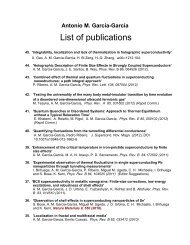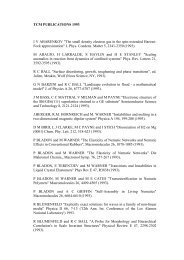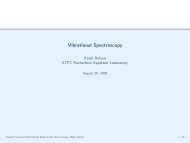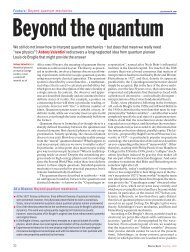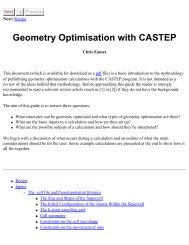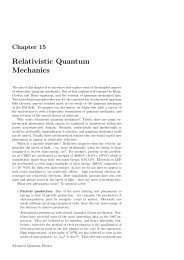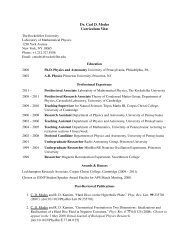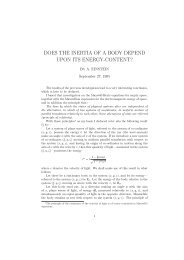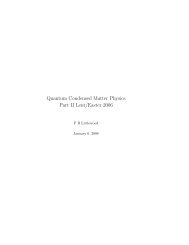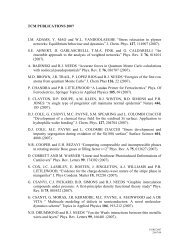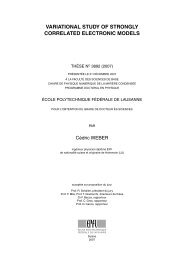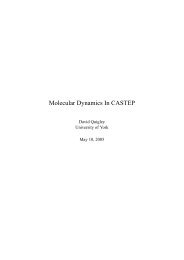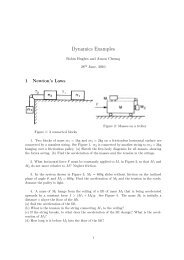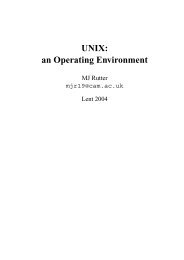CASINO manual - Theory of Condensed Matter
CASINO manual - Theory of Condensed Matter
CASINO manual - Theory of Condensed Matter
You also want an ePaper? Increase the reach of your titles
YUMPU automatically turns print PDFs into web optimized ePapers that Google loves.
• The modification functions are <strong>of</strong> the form<br />
w nl (r) = ( c 0nl + c 1nl r + . . . + c Nnl r N ) (<br />
−Anl r 2 )<br />
exp<br />
r l , (2)<br />
1 + B nl r<br />
where A nl , B nl and {c 0nl , . . . , c Nnl } are optimizable parameters. n and l are the principal and<br />
orbital-angular-momentum quantum numbers <strong>of</strong> the orbitals that are modified using w nl .<br />
• Each modification function w nl is added to the corresponding HF radial function, which is<br />
found by interpolation from the data in awfn.data. The resulting radial function can then be<br />
multiplied by the spherical harmonic Y lm (θ, φ) to give the corresponding orbitals for each <strong>of</strong><br />
the 2l + 1 possible values <strong>of</strong> the magnetic quantum number m. (In fact the radial function is<br />
multiplied by appropriate linear combinations <strong>of</strong> spherical harmonics to give real-valued orbitals.)<br />
• For s orbitals, the value <strong>of</strong> c 1n0 is determined by the electron–nucleus Kato cusp condition:<br />
c 1n0 = −Zc 0n0 , where Z is the atomic number <strong>of</strong> the atom in an all-electron calculation and Z<br />
is zero in a pseudopotential calculation.<br />
• If the spin-dependence flag is set to 1 then different parameters are used for spin-up and spindown<br />
electrons; if it is set to zero then the same parameters are used for spin-up and spin-down<br />
electrons.<br />
• If an orbital with quantum numbers n and l occurs in any determinant in the wave function,<br />
but no corresponding modification function is given in correlation.data, then a warning is<br />
printed and the unmodified orbital is used.<br />
• The ‘expansion order’ specifies the value <strong>of</strong> N in Eq. (2). For s orbitals, the number <strong>of</strong> free c<br />
parameters is N multiplied by the number <strong>of</strong> independent spin types; for orbitals with higher<br />
angular momenta the number <strong>of</strong> c parameters is N + 1 multiplied by the number <strong>of</strong> independent<br />
spin types. The expansion order must be at least 1.<br />
• If parameter values are not supplied (as is the case in the example above) then default values<br />
are used: by default A nl = 1, B nl = 0 and c inl = 0. If too many parameters are given then the<br />
extra ones are ignored.<br />
• Note that we must have A nl > 0 and B nl ≥ 0, otherwise the corresponding orbital is unnormalizable.<br />
7.4.6 Molecular orbital modifications<br />
The format <strong>of</strong> the data set used to specify molecular orbital modifications in correlation.data is as<br />
follows:<br />
START MOLORBMODS<br />
Title<br />
Molecular orbital modifications for the XXX molecule<br />
START GAUSSIAN MO COEFFICIENTS<br />
Parameter values ; Optimizable (0=NO; 1=YES)<br />
END GAUSSIAN MO COEFFICIENTS<br />
START GAUSSIAN EXPONENTS<br />
Parameter values ; Optimizable (0=NO; 1=YES)<br />
END GAUSSIAN EXPONENTS<br />
START GAUSSIAN PRIMITIVE CORRECTIONS<br />
Parameter values ; Optimizable (0=NO; 1=YES)<br />
END GAUSSIAN PRIMITIVE CORRECTIONS<br />
END MOLORBMODS<br />
Each <strong>of</strong> the three blocks for coefficients, exponents and primitives can be present or absent independently.<br />
Notes:<br />
• The success <strong>of</strong> molorbmod optimization is likely to vary from system to system (it is perhaps<br />
best for small molecules, since the algorithm was designed with such systems in mind). One<br />
<strong>of</strong> the main problems is that regions <strong>of</strong> the configuration space where the potential energy is<br />
68



